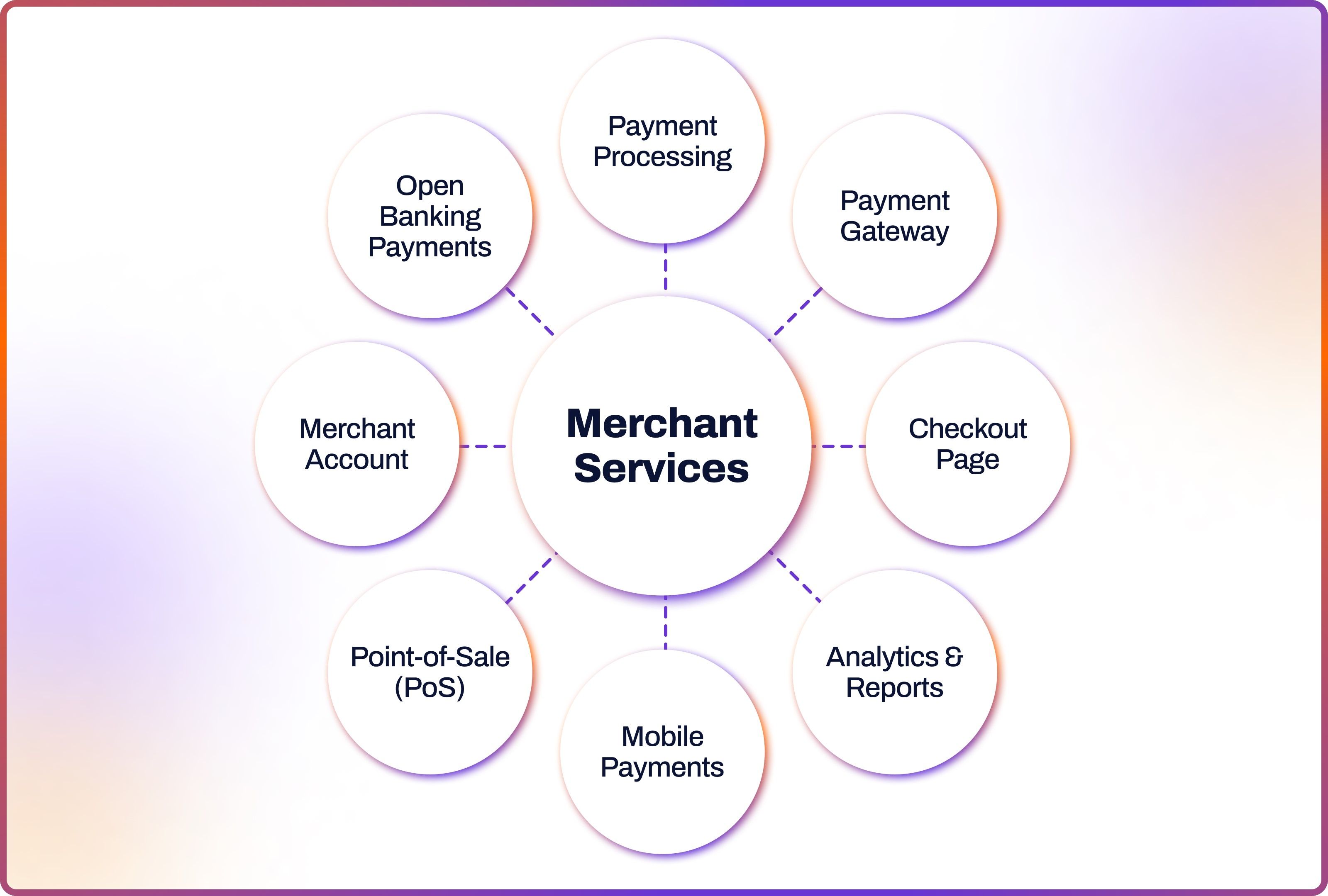
When we think about e-commerce payments, traditional payment processors and gateways usually come to mind. However, this trend is rapidly changing. According to Statista, the global cart abandonment rate among online shoppers in 2025 spikes at 70,19%.
This highlights the importance of having an efficient payment system more than ever before.
In this article, we take a close look at e-commerce merchant services and how to choose the best provider for your business.
Key takeaways:
|
Why E-Commerce Businesses Need Merchant Services
E-commerce businesses sell entirely online. They need merchant services to accept payments smoothly. Partnering with a reliable provider ensures seamless transactions and regulatory compliance. These services often include additional features, such as open banking payments and online reporting tools.
What Is an E-Commerce Merchant Account?
A merchant account is a special type of bank account that lets businesses take card payments. When a customer pays by card, the money doesn’t go straight into your normal business account — it first lands in a merchant account. Most of the time, you won’t set one up yourself, as your payment provider will handle the processing and use their own merchant account, then pass the funds on to you.
Merchant accounts work alongside payment processing, which ensures funds move securely between banks and credit networks, and payment gateways, which encrypt and transmit details between customers and processors. Many providers also offer analytics and reporting tools, customisable checkout pages to improve the customer experience, mobile payment support for digital wallets like Apple Pay and Google Pay, and open banking solutions that enable fast account-to-account transfers through secure APIs.
Some providers give each business its own merchant account, while others pool payments together before paying out. With open banking payments, you don’t need a merchant account at all — the money goes directly into your regular business bank account.

Top 6 Merchant Account Providers
1. Noda
Noda is an open banking payments platform designed for modern e-commerce merchants. With Noda, you can accept instant account-to-account payments directly into your business bank account — no merchant account required. Fees start as low as 0.1%, with no chargebacks, faster settlement than card payments, and coverage across 2,000+ banks in 28 countries in Europe and beyond. Integration is simple through plugins for WooCommerce, Magento, OpenCart and PrestaShop, or via API if you prefer a custom setup. Noda is built for online shops, marketplaces and SMEs that want to cut payment costs, improve cash flow and offer customers a fast, seamless checkout experience.
2. Adyen
Adyen is a global payments platform that combines acquiring, gateway and risk tools in a single solution. Supporting a wide range of local European payment methods and offering in-house acquiring in many markets, Adyen improves authorisation rates and simplifies cross-border expansion for larger merchants. It is widely recognised as a good option for businesses that need scale, deep local coverage and rich reporting. For smaller and mid-sized businesses, pricing and complex implementation constitute significant downsides.
3. Checkout.com
Checkout.com provides an API-first payments stack with multi-currency processing, smart routing, and fraud tools aimed at optimising acceptance and reducing costs. The platform is built for performance and for merchants that want fine-grained control over ecommerce merchant processing, reconciliation and local payment methods across Europe. Checkout.com is a strong ecommerce merchant account provider, however, the company’s enterprise focus means very small businesses may find minimums or contractual terms restrictive.
4. Stripe
Stripe is a developer-friendly payments platform with broad support for cards, wallets and subscriptions in the UK and EU. It offers extensive documentation, pre-built integrations for common platforms, and a suite of products for payments, billing and payouts, making it well-suited to SaaS, marketplaces and merchants in ecommerce environments. Despite that, some features and international card fees can make costs higher. While Stripe’s standard pricing is competitive, smaller businesses and those handling many cross-border transactions often find it less cost-effective than alternatives.
5. Worldpay
Worldpay is a UK-rooted acquirer specialising in POS terminals and physical card payment processing, as well as offering online merchant services, broad alternative payment method coverage, and multi-currency support for merchants trading across the globe. A good choice for businesses setting up a merchant account for e-commerce, it is often chosen by mid-sized and enterprise merchants who require integrated terminals, reporting and electronic commerce merchant services. However, there is a significant drawback: the platform’s legacy systems and recent ownership changes can result in inconsistent sales and support experiences for customers in different world regions.
6. PayPal and Braintree
PayPal and Braintree provide easy onboarding, recognisable checkout options and broad currency coverage, helping conversion for consumers across many markets. Braintree offers developer tools and SDKs for card and wallet acceptance, while PayPal provides trust and a familiar checkout flow. Both are widely used as e-commerce merchant solutions; however, high merchant fees and dispute outcomes are sometimes less favourable for sellers compared with other providers.
Fees are Associated with Merchant Services
As an e-commerce business, you may encounter various payment fees. These can vary between providers, so it's important to check with each provider for specific details. Ensure you understand how their pricing works and confirm it fits within your budget. Below are some typical fees:
| Fee type | Description |
| Payment Gateway | Integration fee for hosted checkout pages and API for custom development |
| Transaction Cost | Charged per transaction for processing credit and debit card payments |
| Chargebacks | Fee for a reversed transaction |
| Early Termination Fee | Charged if the contract is exited early, often based on the remaining contract period |
| Setup Fee | Initial cost to set up physical or virtual terminal |
| Cancellation Fee | Fixed fee for canceling the contract |
| Minimum Monthly Transaction Fee | Smallest amount charged monthly on transaction fees |
| Data Security Management | Fee for ensuring PCI compliance standards are met |
| Non-secure Transaction | Fees for high-risk payments like mail, telephone, online (not pay-by-link), and non-chip and PIN payments |
| Refunds | Fee for processing refunds |
| Anti-Fraud Monitoring | Fee for services that monitor transactions to detect and prevent fraudulent activity |
| Authorisation Fee | Charged each time a business authorises a credit card transaction |
How to Choose a Merchant Service Provider
Follow these steps to make an informed decision and pick the right provider:
Step 1: Assess your needs
Consider your sales volume, average transaction size and preferred payment methods. Think about the currencies you need to accept and the countries where your clients will be paying from. This helps you identify which features are essential for your business.
Step 2: Compare providers
Look at reviews and recommendations from other businesses. Check that providers offer strong security, PCI DSS compliance, integration with your existing systems and transparent pricing. Pay attention to customer support quality and independent feedback on sites such as Trustpilot.
Step 3: Test services
Take advantage of demos or trial periods. Evaluate ease of use, processing speed and overall reliability before committing.
Merchant Services with Noda
Noda is a global open banking provider that assists merchants in e-commerce with end-user KYC, payment processing, LTV forecasting and UX optimisation. We partner with 2,000 banks across 28 countries, spanning over 30,000 bank branches. Noda supports a wide range of currencies for globally-minded clients. We offer scalable plans to fuel your business growth, along with e-commerce plugins for easy integration.
With Noda, you can accept both open banking and card payments through a single, seamless integration, giving your customers more choice at checkout. Open banking payments land instantly in your business account with fees from just 0.1% and no chargebacks, while card payments are fully supported through Apple Pay, Google Pay and major card networks. Noda’s API and ready-made plugins make setup quick and easy, whether you’re running an online shop, a marketplace or a subscription service. The result is lower costs, faster cash flow and a smoother payment experience for your customers.
Why Choose Noda for E-commerce Merchant Services?
If you are looking for an e-commerce merchant services provider, look no further – this is where Noda can help. We offer:
- Ultra-low fees from 0.1% to boost margins
- Coverage across 2,000+ banks in 28 countries in Europe and beyond, with multi-currency support
- Instant account-to-account settlement with no intermediaries
- Integration with cards, Apple Pay and Google Pay for broader reach
- Plug and play integration via plugins for WooCommerce, Magento, OpenCart and PrestaShop
- Instant payment links to collect payments without a website or coding
- No chargebacks, reducing fraud risk
- Personal assistance with a dedicated account manager
Book a free demo to see how Noda can help you improve checkout and drive conversions.
FAQs
Do you need a merchant account for ecommerce?
Yes, you need a merchant account for e-commerce to accept online payments. A merchant account acts as a bridge between your customer's bank and your business's bank, facilitating smooth and secure transactions.
How do I set up a merchant account for ecommerce?
Once you've chosen a provider, you can typically apply online and go through the setup process, which may include submitting business documents and setting up payment gateways. There are typically multiple integration options available: through APIs or UIs, just to name a few.
What are the best merchant services for small e-commerce businesses?
The best merchant services for small e-commerce businesses would offer a combination of user-friendly payment processing, robust security, and affordable pricing. Look for providers that support multiple payment methods. Providers that offer flexible contract terms and transparent fee structures may be especially beneficial for small businesses.
Latest from Noda

6 Fintech Trends to Watch in 2026

Open Banking Benefits for UK E-commerce Merchants

WorldPay Review for Merchants 2026



